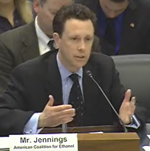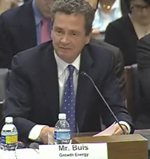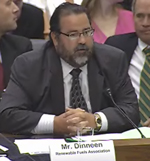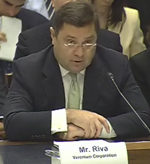Representatives from ethanol organizations and companies testified before the House Agriculture Committee this morning on proposed low carbon fuel standards.
 The heads of three ethanol trade associations all presented basically the same message when it comes to using indirect land use changes (ILUC) to evaluate the greenhouse gas emissions of renewable fuels – it is unproven theory that should not be used.
The heads of three ethanol trade associations all presented basically the same message when it comes to using indirect land use changes (ILUC) to evaluate the greenhouse gas emissions of renewable fuels – it is unproven theory that should not be used.
“The architect of the ILUC theory is Mr. Tim Searchinger,” said American Coalition for Ethanol executive director Brian Jennings. “Mr. Searchinger is not a scientist or an economist. He is an attorney, who for most of his career worked at the environmental organization Environmental Defense, consistently attacking American farmers and ranchers and the public policies that ensure our stable supply of food, fiber and fuel.”
 Tom Buis, CEO of Growth Energy, said they would support ILUC if it were done correctly. “First, it should apply equally to all transportation fuels. Second, it should be based on universally accepted science and economic modeling. Third, the international land use requirement should be eliminated,” Buis said. “The low carbon fuel standard proposals at the state and federal level that we have reviewed do not meet these two requirements. Oddly, science and parity have not been part of the equation – which makes us seriously question the motivation.”
Tom Buis, CEO of Growth Energy, said they would support ILUC if it were done correctly. “First, it should apply equally to all transportation fuels. Second, it should be based on universally accepted science and economic modeling. Third, the international land use requirement should be eliminated,” Buis said. “The low carbon fuel standard proposals at the state and federal level that we have reviewed do not meet these two requirements. Oddly, science and parity have not been part of the equation – which makes us seriously question the motivation.”
 Renewable Fuels Association president and CEO Bob Dinneen says the modeling being used to determine indirect land use is simply not good science. “The tremendous uncertainty and inherent lack of transparency associated with analysis of international indirect land use changes makes it extremely difficult for regulators to legitimately use these results to assign penalties for international indirect effects to the carbon score of various biofuels,” Dinneen said. “Models should be seen as learning tools, not truth machines.”
Renewable Fuels Association president and CEO Bob Dinneen says the modeling being used to determine indirect land use is simply not good science. “The tremendous uncertainty and inherent lack of transparency associated with analysis of international indirect land use changes makes it extremely difficult for regulators to legitimately use these results to assign penalties for international indirect effects to the carbon score of various biofuels,” Dinneen said. “Models should be seen as learning tools, not truth machines.”
Dinneen also said they believe the EPA’s lifecycle greenhouse gas analysis of ethanol is not what Congress intended in the 2007 Energy Independence and Security Act (EISA) which specifically limited such consideration of indirect emissions to those “related to the full fuel lifecycle, including all stages of fuel and feedstock production and distribution” – not food production.
 Testimony also centered on the impact ILUC calculations could have on the future development of advance biofuels. “In my view, there are not, and will not be, any “significant” indirect impacts from advanced biofuels production – the literal test required by the terms of EISA,” said Verenium president and CEO Carlos Riva. “Because there is zero commercial-scale production of such fuels today, and there are only trivial quantities of advanced biofuels production in prospect in the immediate 3-5 year time horizon. We have the time to get this right, and we must get it right.” He encouraged the panel to recommend modifications to EPA’s proposed rule.
Testimony also centered on the impact ILUC calculations could have on the future development of advance biofuels. “In my view, there are not, and will not be, any “significant” indirect impacts from advanced biofuels production – the literal test required by the terms of EISA,” said Verenium president and CEO Carlos Riva. “Because there is zero commercial-scale production of such fuels today, and there are only trivial quantities of advanced biofuels production in prospect in the immediate 3-5 year time horizon. We have the time to get this right, and we must get it right.” He encouraged the panel to recommend modifications to EPA’s proposed rule.

